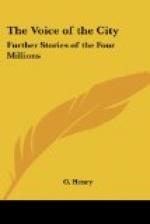“The Rankinses’ hogs weighed more’n ourn a whole passel, but the mast in thar neighborhood was a fine chance better than what it was down—”
The fat man moved away unostentatiously, and bought roasted chestnuts to cover his alarm.
Sam felt the need of a drop of mountain dew. Across the street men passed in and out through swinging doors. Brief glimpses could be had of a glistening bar and its bedeckings. The feudist crossed and essayed to enter. Again had Art eliminated the familiar circle. Sam’s hand found no door-knob—it slid, in vain, over a rectangular brass plate and polished oak with nothing even so large as a pin’s head upon which his fingers might close.
Abashed, reddened, heartbroken, he walked away from the bootless door and sat upon a step. A locust club tickled him in the ribs.
“Take a walk for yourself,” said the policeman. “You’ve been loafing around here long enough.”
At the next corner a shrill whistle sounded in Sam’s ear. He wheeled around and saw a black-browed villain scowling at him over peanuts heaped on a steaming machine. He started across the street. An immense engine, running without mules, with the voice of a bull and the smell of a smoky lamp, whizzed past, grazing his knee. A cab-driver bumped him with a hub and explained to him that kind words were invented to be used on other occasions. A motorman clanged his bell wildly and, for once in his life, corroborated a cab-driver. A large lady in a changeable silk waist dug an elbow into his back, and a newsy pensively pelted him with banana rinds, murmuring, “I hates to do it—but if anybody seen me let it pass!”
Cal Harkness, his day’s work over and his express wagon stabled, turned the sharp edge of the building that, by the cheek of architects, is modelled upon a safety razor. Out of the mass of hurrying people his eye picked up, three yards away, the surviving bloody and implacable foe of his kith and kin.
He stopped short and wavered for a moment, being unarmed and sharply surprised. But the keen mountaineer’s eye of Sam Folwell had picked him out.
There was a sudden spring, a ripple in the stream of passers-by and the sound of Sam’s voice crying:
“Howdy, Cal! I’m durned glad to see ye.”
And in the angles of Broadway, Fifth Avenue and Twenty-third Street the Cumberland feudists shook hands.
XV
ROSES, RUSES AND ROMANCE
Ravenel—Ravenel, the traveller, artist and poet, threw his magazine to the floor. Sammy Brown, broker’s clerk, who sat by the window, jumped.
“What is it, Ravvy?” he asked. “The critics been hammering your stock down?”
“Romance is dead,” said Ravenel, lightly. When Ravenel spoke lightly he was generally serious. He picked up the magazine and fluttered its leaves.




